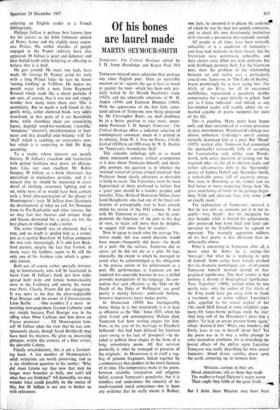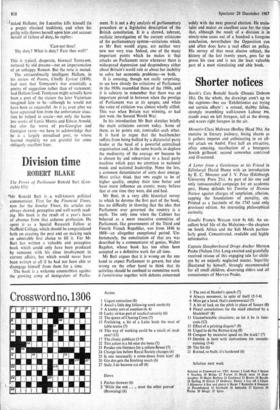Of his bones are laurel made
MARTIN SEYMOUR-SMITH
Tennyson enjoyed more adulation than perhaps any other English poet. Then an inevitable reaction set in—against the age at least as much as against the man—which has been only par- tially halted by Sir Harold Nicolson's study (1923), and the admirable selections of W. H. Auden (1946) and Edmund Blunden (1960). With the appearance of the first fully anno- tate&edition of Tennyson, now being prepared by Mr Christopher Ricks, we shall doubtless be in a better position to take stock; mean- while Professor J. D. Jump's Tennyson : The Critical Heritage offers a judicious selection of contemporary comment, much of it printed in its entirety, from. W. J. Fox on Poems, Chiefly Lyrical (1830) to an 1890 essay by W. E. Henley on 'Tennyson's Assimilative Skill.'
This valuable anthology tells us as much about .nineteenth century critical assumptions as it does about' Tennyson himself; and inevit- ably prompts the question as to whether the 'marked revival of serious critical attention' that Professor Jump clearly advocates as desirable is likely ao occur. The Victorians, even the most hypocritical of them, professed to believe that a 'great' poet should be a teacher, prophet and moralist. Thus, Richard Monckton Milnes (later Lord Houghton), who had one of the finest col- lections of pornography ever to have existed, ended bis review of the 1842 volume, 'It rests with Mr Tennyson to prove . . . that he com- prehends the functions of the poet in this day of ours, to teach still more than he delights, to suggest still more than he teaches.'
Now to agree to teach what the average Vic- torian reader felt was sound doctrine would have meant—frequently did mean—the death of a poet. 'On the surface, Tennyson did so agree; yet he did not die as a poet. In fact, unusually, the extent to which he managed to avoid what he acknowledged as his obligation is the precise extent of his achievement as a poet. His performances as Laureate are not rendered less execrable because he was a skilled prosodic manipulator of the language. the con- tention that such effusions as the 'Ode on the Death of the Duke of Wellington' are good poetry is merely bizarre: contrived rhetoric, however impressive, never makes poetry.
In Memoriam (1850) has incomparably better things in it, but structurally it is at least as offensive as the 'Ode.' Since 1833, when his close friend and contemporary Hallam died, Tennyson had been writing elegies for him. Now, in the year of his marriage to Elizabeth Seliwood—this had been delayed for fourteen years owing to his lack of 'prospects'—he de- cided to publish these elegies in the form of a long, consolatory poem. All that survives poetically is what he managed to preserve of the originals: In Memoriam is in itself a rag- bag of genuine fragments, linked together by a commentary that panders to the worst features of its time. The compromise made in the poem, between scientific rationalism and religious belief, assured Tennyson's popularity; but it is mindless and undermines the sincerity of his much-vaunted social conscience—nor is there any evidence that he really meant it. Rather, one feels, he invented it to please the audienctit of which he was by then too acutely conscious, and to check his own disastrously instinctive drift towards a pessimism that wickedly excited.
All people at all times have been mentally unhealthy—it is a condition of humanity— and have had skeletons in their closets; but the Victorians were notoriously unhealthy, and their closets were filled not with skeletons but with thrillingly purulent flesh. For the Victorian poet, then, the problem of the relationship between art and reality was a particularly crucial one. Tennyson, in 'The Lady of Shalott,' began promisingly by at least seeing this; The Idylls of the King, for all its occasional mellifluities, represented a peculiarly shabby compromise for a poet initially so gifted. And yet, as I have indicated—and indeed, as any fair-minded reader will readily admit—he re- mained capable of poetic moments for most of his life.
This is puzzling. Many poets have begun well, and then surrendered to various pressures in their environments. Wordsworth's dotage was almost unbroken; Coleridge's moral anxiety virtually destroyed him as a poet. But 'Maud' (1855), written after Tennyson had committed the (poetically) irrevocable folly of accepting the Laureateship—and, unlike even Words- worth, with every intention of turning out the required odes—is, for all its obvious faults and rather self-conscious debt to the 'Spasmodic' poetry of Sydney Dobell and Alexander Smith, a remarkable poem, full of eccentric energy. Not even in Browning at his wildest can we find better or more surprising things than 'the gross mud-honey of town' or the passage begin- ning 'Cold and clear-cut face, why come par.' so cruelly meek.'
The explanation of Tennyson's survival is that he was not—as someone put it to me re- cently—'very bright'; that his incapacity for real thought, while it limited his achievement, also preserved him from final and fatal sub- servience to the Establishment he aspired to represent. The strangely aggressive oddness of his best poetry is less obstinate than in- tellectually obtuse.
What is interesting in Tennyson, after all, is never what he thinks he is saying—his `message'—but what he is implying in spite of himself. Some critics have naively claimed that his dramatic monologues are—as of course Tennyson himself insisted—devoid of bio- graphical significance. The short answer is that nothing is devoid of biographical significance. Take `Lucretius' (1868), written when he was nearly sixty; only the author of The Idylls of the King could have got away with so frank a treatment of an erotic subject. Lucretius's wife, appalled by his sexual neglect of her ('his mind/Half buried in some weightier argu- ment,/Or fancy-borne perhaps upon the rise/ And long roll of the Hexameter') gives him a philtre 'To lead an errant passion home again,' which 'destroy'd him.' What, one wonders, did Emily have to say to herself about this? Yet the poem was in its way a noble attempt to solve immediate problems, for in describing the horrid effects of the philtre upon Lucretius Tennyson was really describing his own sexual fantasies: blood drives rainlike down upon the earth, conjuring up, to torment him:
'Hetairai, curious in their art, Hired animalisms, vile as those that made The mulberry-faced Dictator's orgies worse Than aught they fable of the quiet Gods .. '
But I think these Hetairai may have been (naked Hallams, for Lucretius kills himself (in a proper classical tradition), and when his guilty wife throws herself upon him and accuses herself of failure of duty, he replies:
`Care not thou!
Thy duty? What is duty? Fare thee well!.'
This is typical, desperate, bisexual Tennyson, tortured by old dreams—not an impersonation of an unhappy Roman. But the note is muted.
The extraordinarily intelligent Hallam, in his review of Poems, Chiefly Lyrical (1830), had seen that Tennyson's was essentially a poetry of suggestion rather than of statement; had Hallam lived, Tennyson might actually have been a poet of the stature the later Victorians imagined him to be—although he would not have been as successful. As it is, even after we have separated him from the unfortunate situa- tion he helped to create—not only the harm- less works of Lewis Morris and Edwin Arnold, but also the worst of pre-Georgian and Georgian verse—we have to acknowledge that he is a largely unrealised poet, to whose learned stupidity we are grateful for some obliquely excellent lines.











































 Previous page
Previous page